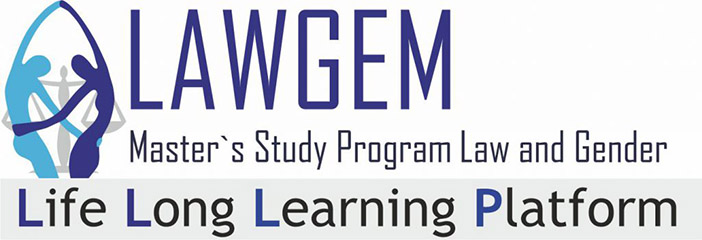In her lecture, Prof. Dr. Susanne Baer pointed out that law has, in most contexts, developed without a proper recognition of gender. As a result, legal systems and the theories that inform them have largely relied on a stereotypical image of the legal person or subject as male, and heterosexual, white, able-bodied, middle-aged, etc. In many regards, this has produced a biased order of social relations. With gender studies we are able to understand this process. A critical analysis of law with regard to gender also results in critical approaches that challenge not only the law. In fact, it also challenges the legal profession. A nu-anced understanding of gender in law allows us to not only reconceptualize legal concepts and underlying theories. It also informs critique, and allows us to alter professional practice in legislation and administration, in the work of judges and lawyers as well as people who teach law. Thus, there are good reasons to include gender, as one aspect relevant to all areas of law, in legal education, be it in universities, professional schools or on the job. To date, gender studies in law have created the opportunity to enhance our understanding of the world by integrating gender into the mainstream of legal education. However, this is only worth doing if gender is not reduced to false ideas of man/woman, or to limited under-standings of sex/sexuality, or denounced as a pre-defined political agenda. Rather, gender in law is an analytical concept that addresses particular, and constantly changing, utterly relevant aspects of social relations. Clearly, this is the case in Family Law and the law of intimate relationships, as well as in Labour Law and in social or welfare state regulation as well as in Tax Law. Also, a proper understanding of gender is extremely relevant in Administrative Law, be it on education or city planning, or in security regulation and Police Law. Overall, legal gender studies have produced many examples to demonstrate how gender in law allows us to acknowledge, and to properly address, the needs and interests of all people by legal means, thus contributing to a more just society.
 Prof. Dr. Susanne Baer serves as Justice of the Federal Constitutional Court in Germany, elected by parliament, the Deutscher Bundestag, in 2011 to the First Senate, for a 12 years term. She is also the Professor of Public Law and Gender Studies at Humboldt University Berlin and a James W. Cook Global Law Professor at the University of Michigan Law School, and has taught at CEU Budapest, in Austria, Switzerland and Canada. She received an honorary doctorate from the University of Michigan in 2014 and was elected a Coresponding Fellow of the British Academy in 2017. Justice Baer studied law and political science and joined movements against discrimination and domestic violence; she directed the GenderCompetenceCentre to advise the German federal government on gender mainstreaming 2003-2010 and co-drafted German standards for equality in research. At Humboldt University, she served as Vice-President and as Vice Dean and Director of Gender Studies, founded the Law and Society Institute Berlin and the Humboldt Law Clinic in Fundamental and Human Rights. Her publications in English include: Comparative Constitutionalism, 2016 (with Norman Dorsen, Michel Rosenfeld, András Sajó, Susanna Mancini); Privatizing Religion, Constellations 1 (2013), 68-84; Equality, in: Rosenfeld/ Sajo, The Oxford Handbook of Comparative Constitutional Law, 2012, 982-1001; Dignity, Liberty, Equality: A Fundamental Rights Triangle of Constitutionalism, Toronto LJ 4 (2009) 417-468; The Difference a Justice May Make: Remarks at the Symposium for Justice Ruth Bader Ginsburg, Columbia J of Gender & Law 25 (2013).
Prof. Dr. Susanne Baer serves as Justice of the Federal Constitutional Court in Germany, elected by parliament, the Deutscher Bundestag, in 2011 to the First Senate, for a 12 years term. She is also the Professor of Public Law and Gender Studies at Humboldt University Berlin and a James W. Cook Global Law Professor at the University of Michigan Law School, and has taught at CEU Budapest, in Austria, Switzerland and Canada. She received an honorary doctorate from the University of Michigan in 2014 and was elected a Coresponding Fellow of the British Academy in 2017. Justice Baer studied law and political science and joined movements against discrimination and domestic violence; she directed the GenderCompetenceCentre to advise the German federal government on gender mainstreaming 2003-2010 and co-drafted German standards for equality in research. At Humboldt University, she served as Vice-President and as Vice Dean and Director of Gender Studies, founded the Law and Society Institute Berlin and the Humboldt Law Clinic in Fundamental and Human Rights. Her publications in English include: Comparative Constitutionalism, 2016 (with Norman Dorsen, Michel Rosenfeld, András Sajó, Susanna Mancini); Privatizing Religion, Constellations 1 (2013), 68-84; Equality, in: Rosenfeld/ Sajo, The Oxford Handbook of Comparative Constitutional Law, 2012, 982-1001; Dignity, Liberty, Equality: A Fundamental Rights Triangle of Constitutionalism, Toronto LJ 4 (2009) 417-468; The Difference a Justice May Make: Remarks at the Symposium for Justice Ruth Bader Ginsburg, Columbia J of Gender & Law 25 (2013).

